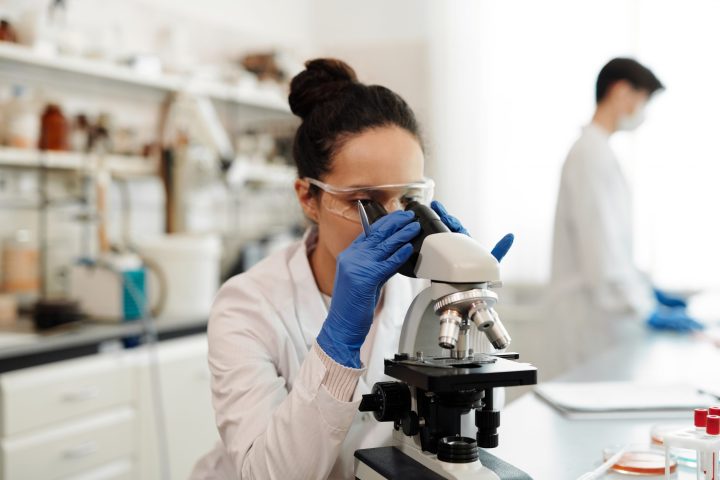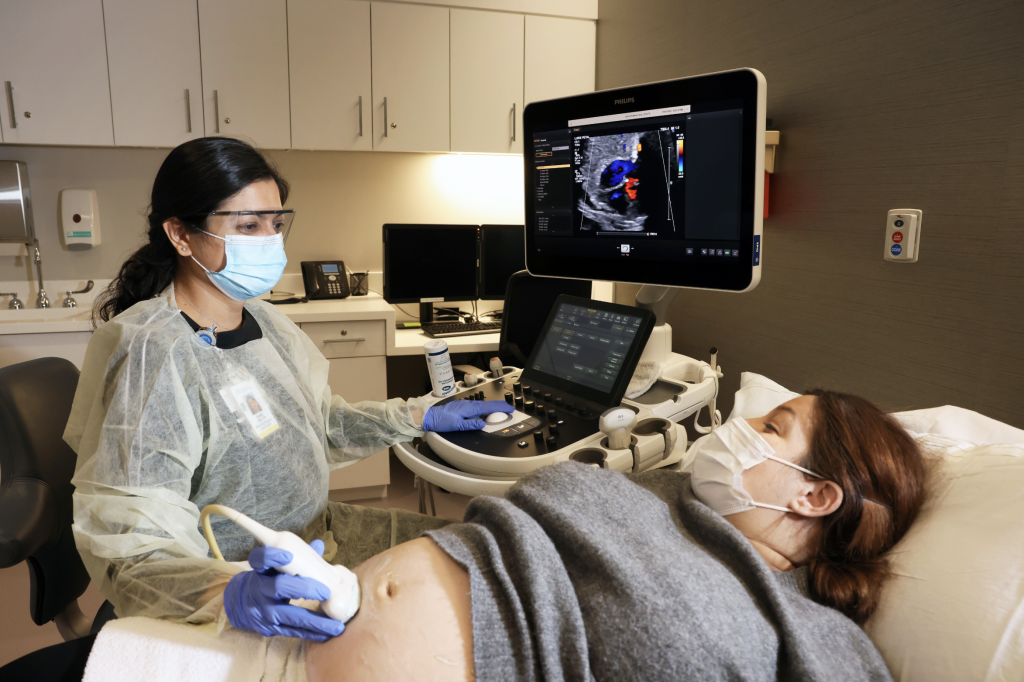Heredity and Pregnancy I Genetic Risks
Genetic Disorders
Diagnosis & Treatments
How we look for genetic disorders
Boston Children's provides genetic testing for pregnant women, newborns, and children of all ages. In some cases, a diagnosis can be made after a physical exam. Most of the time, genetic disorders are diagnosed through a specific test, which can include examining chromosomes or DNA (the tiny proteins that make up genes), or testing the blood for certain enzymes that may be abnormal. Studying enzymes is called biochemical genetic testing.
At your initial appointment, a member of the genetics team (a genetic counselor, a clinical genetics fellow, and/or a geneticist) will review your medical, family, and pregnancy history and perform tests. Tests may include x-rays, an MRI, or genetic tests (usually blood or urine tests). Your child may also be referred to a specialty clinic within the hospital.
The different categories of genetic tests are:
Predictive genetic testing can tell you the chances that a healthy person with or without a family history of a certain disease might develop that disease. These diseases can include some types of cancer and heart disease.
Presymptomatic genetic testing can tell if a person with a family history for a genetic disease but does not have symptoms or has a genetic alteration associated with the disease.
Carrier testing can determine if a person carries one copy of a gene linked to a certain disease. An "autosomal recessive" disease means that the disease will appear only if two copies of the altered gene are inherited. Couples who both carry the same autosomal recessive gene have a one in four, or 25 percent, chance with each pregnancy to have a child with that disease.
Prenatal diagnosis is used to diagnose a genetic disease or condition in the developing fetus. Prenatal tests include screening blood, ultrasound (sonograms), amniocentesis, chorionic villus sampling (CVS), and percutaneous umbilical blood sampling (PUBS).
Preimplantation studies are used only in in vitro fertilization to diagnose a genetic disease in an embryo before it is implanted into the mother's uterus.
Newborn screening is used to check for certain genetic disorders that can be diagnosed and treated early in life.
How we address genetic disorders
Tying genetics to dyslexia allows us to identify a potential problem at birth, so that gives us the earliest possible chance to intervene. Doctors might make diagnoses using brain imaging, before reading even starts.~ — Christopher Walsh, MD, PhD, Boston Children's Hospital Chief of Genetics ~
Treatment of genetic disorders varies depending on the specific disease. In some cases, such as autism, the symptoms are treated with medication, behavioral, and educational interventions. Other disorders, such as PKU (phenylketonuria), can be managed through diet, while some of the physical symptoms of certain genetic diseases can be corrected with surgery. In many cases, your child will need ancillary services that may include speech therapy and occupational therapy, among others.
Whatever your child's diagnosis, a member of your child's genetic team will discuss treatment options with you and your family and make the appropriate referrals when necessary. We understand the kinds of challenges children and families with genetic disorders face and can connect you with outside resources for additional support.
Genetic Counseling

What is Genetic Counseling?
Genetic counseling gives you information about how genetic conditions might affect you or your family. The genetic counselor or other healthcare professional will collect your personal and family health history. They can use this information to determine how likely it is that you or your family member has a genetic condition. Based on this information, the genetic counselor can help you decide whether a genetic test might be right for you or your relative.
Learn more about genetic counseling in the time of COVID-19.
Reasons for Genetic Counseling
Based on your personal and family health history, your doctor can refer you for genetic counseling. There are different stages in your life when you might be referred for genetic counseling:
Planning for Pregnancy: Genetic counseling before you become pregnant can address concerns about factors that might affect your baby during infancy or childhood or your ability to become pregnant, includingGenetic conditions that run in your family or your partner’s familyHistory of infertility, multiple miscarriages, or stillbirthPrevious pregnancy or child affected by a birth defect or genetic conditionAssisted Reproductive Technology (ART) options
During Pregnancy: Genetic counseling while you are pregnant can address certain tests that may be done during your pregnancy, any detected problems, or conditions that might affect your baby during infancy or childhood, includingHistory of infertility, multiple miscarriages, or stillbirthPrevious pregnancy or child affected by a birth defect or genetic conditionAbnormal test results, such as a blood test, ultrasound, Chorionic Villus Sampling (CVS), or amniocentesisMaternal infections, such as Cytomegalovirus (CMV), and other exposures such as medicines, drugs, chemicals, and x-raysGenetic screening that is recommended for all pregnant women, which includes cystic fibrosis, sickle cell disease, and any conditions that run in your family or your partner’s family
Caring for Children: Genetic counseling can address concerns if your child is showing signs and symptoms of a disorder that might be genetic, includingAbnormal newborn screening resultsBirth defectsIntellectual disability or developmental disabilitiesAutism spectrum disorders (ASD)Vision or hearing problems
Managing Your Health: Genetic counseling for adults includes specialty areas such as cardiovascular, psychiatric, and cancer. Genetic counseling can be helpful if you have symptoms of a condition or have a family history of a condition that makes you more likely to be affected with that condition, includingHereditary breast and ovarian cancer (HBOC) syndromeLynch syndrome (hereditary colorectal and other cancers)Familial hypercholesterolemiaMuscular dystrophy and other muscle diseasesInherited movement disorders such as Huntington’s diseaseInherited blood disorders such as sickle cell disease
Following your genetic counseling session, you might decide to have genetic testing. Genetic counseling after testing can help you better understand your test results and treatment options, help you deal with emotional concerns, and refer you to other healthcare providers and advocacy and support groups.
Find a Genetics Specialist
There are various ways to access genetic counseling services, including in person, by phone, and by video conference.
Find a genetic counselor using the National Society of Genetic Counselors directory.
Find a genetics clinic using the American College of Medical Genetics and Genomics Genetics Clinics Database.






















